It’s a bold move in an eight-episode series to dedicate the entire fifth hour to a character that has never before appeared on screen. Particularly when that character is the dead wife of a morally-grey protagonist, a position that’s rife with stereotypes, tropes, and problematic pitfalls. But in a lot of ways the entire narrative of 3% hinges on “Water,” an episode-long exploration of Ezequiel’s wife Julia.
Julia’s story opens up a wide new range of questions about The Process, the Offshore, and about Ezequiel. Though none of the candidates in the current Process have ever met her, Julia’s struggles and choices cast their own predicaments and moral quandaries in a new light: it’s hard to stop thinking about her as the characters reconnect with their own families and pasts, and explore what the Process really means to them. “Water” manages to accomplish all of these things. But it truly works as a story for the same reason the rest of 3% usually works: it allows its characters to be real people, vibrant and dynamic figures in their own right outside of their larger narrative purpose.
Warning: spoilers for episodes 1 – 6 of 3% on the recaps and the analysis.
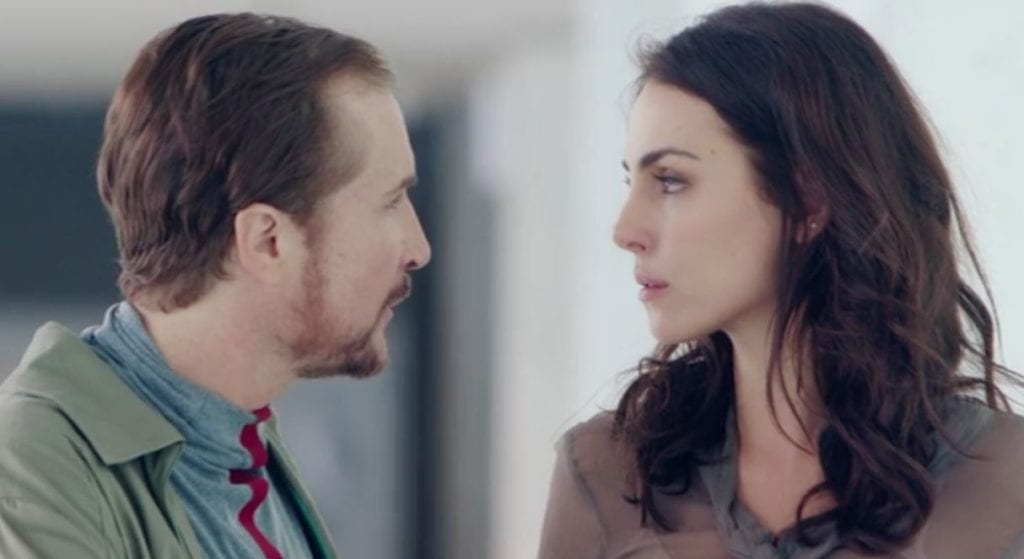
Episode 5 – Water
Aline confronts Ezequiel about a set of fingerprints she found in his cube. We know per last episode that she was trying to obtain Ezequiel’s fingerprints to bypass his security system, but she found a little boy’s instead. She demands to know who is this boy and Ezequiel’s aggressive reaction confirms she found his weak spot. Aline says she won’t tell anyone anything as long as Ezequiel renounces his post and puts a good word for her to be the next head of the Process. As she leaves him to ponder her “offer”, Ezequiel loses himself in memories.
Five years ago, Ezequiel had just been promoted head of the Process. We finally meet his mysterious wife Julia: a beautiful, cheerful, and supportive young woman that helps him cope with the stress of his new position. Julia’s influence on Ezequiel is obvious from the start, as she was the one to decorate his office, hers were the words Ezequiel uses to this day in his welcome speech, and her soothing ritual of pouring water on his head would later become his current self-drowning habits.
Julia is also a Process employee and had to leave her post on initial interviews after the questionable elimination of a candidate. While Ezequiel explains her new job behind security cameras, they witness an operation to capture Cause agents that results in the death of an innocent civilian. This civilian left behind a little boy, and the sight of him prompts a change in Julia. Alone with the cameras, Julia cries watching the boy and becomes obsessed with finding him. Her breaking point comes when an eliminated candidate calls Julia out on her privilege and Julia violently beats her. The council is worried about her and Ezequiel wants her to go work Offshore, though he wouldn’t be able to go with her.
It’s Ezequiel’s third year as head of the Process and his relationship with Julia is cold. He learns she’s obsessed with the orphan when he notices the operation video was visualized over a hundred times. When confronted, Julia reveals she had a son before passing the Process. Young mothers are not supposed to bond with or name their children before their Process, but Julia named her son Augusto. The man who took care of Augusto after she left is now dead, and she wants to see him. Ezequiel says that’s impossible and she’ll see him in a few years should he pass the Process. Julia questions what happens if he doesn’t and Ezequiel says it means he’s “one of them” and doesn’t deserve to be missed. Ouch. Julia calls Ezequiel on his shit, and says what they’re doing is wrong and he only sees what he wants to see.
Ezequiel considers changing his job so they could both live Offshore. Julia hears him talking about the operation and realizes the audio must contain some clue. She learns how to reach her son’s house and decides to leave the Selection Facility in disguise. Ezequiel stops her outside the gates and Julia is taken to a Recovery and Treatment Center (RTC) Offshore. Ezequiel asks Cassia if Julia will be okay and Cassia says the best professionals available Offshore are taking care of her.
Offshore, Julia can’t stop thinking about her son. Staring at the ocean that separates them, she walks into the water and slowly drowns herself. She was the first person to commit suicide Offshore and the news devastate Ezequiel. His self-drowning stress-coping ritual is born and he refuses to leave his job, saying he’s the best person to prevent this from ever happening again. Later he finds a picture of Augusto and decides to go Inland to find him.
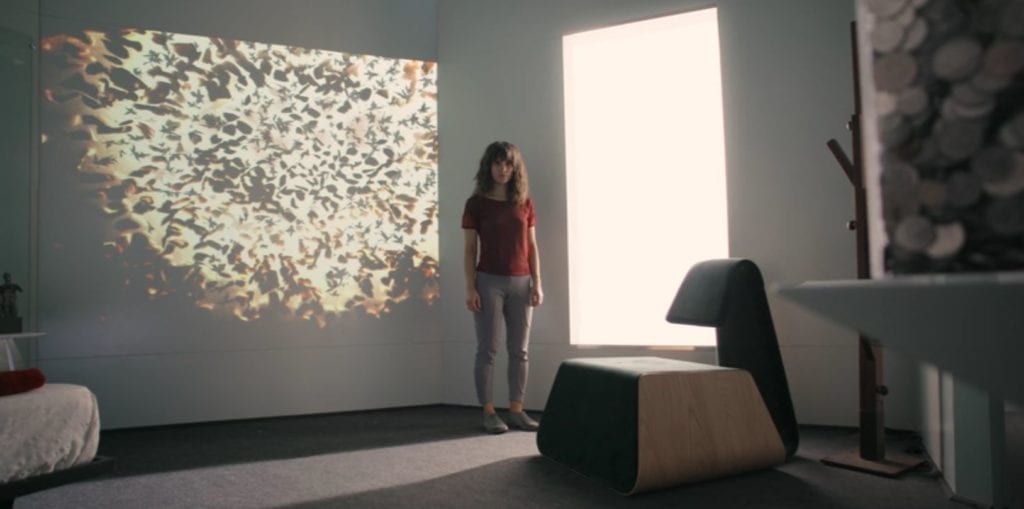
Episode 6 – Glass
In the next test of the Process, each candidate gets an individual room where a family member awaits. Fernando’s father explains the family members are supposed to encourage the candidates to give up the Process and take a glass of coins home. Fernando says it’s enough money for them to live a comfortable life and he’s more than happy to leave, as he’s disappointed with the Process. His father finds that outrageous and they fight. He says Fernando will be on his own if he leaves the Process, which makes him stay. Later Fernando finds Michele and tells her she was the only good thing that happened to him in this Process, and they sleep together.
Rafael’s visited by his mother, who calls him a traitor for stealing his brother’s ID. She says the money could help his family and wants him to leave, but he argues what he’s doing is more important than that. They fight and his mother threatens to expose him if he doesn’t leave now. But this is Rafael we’re talking about: if she exposes him, he’ll claim it was her idea and her remaining children will be forbidden to join the Process forever. She leaves him defeated, yelling he betrayed his family.
Joana is in a tough situation: a man entered the Selection Facility claiming to be her father, but he was actually after the bounty on her head. He says the glass contains more money than the promised reward, so instead of killing her they can leave the Process together and he’ll take the money. After failing to knock him out, Joana says he can kill her because she wants to pass the Process and won’t leave. The man reveals his identity as a Process employee sent by Ezequiel to test if Joana really wanted to pass or she was just running away. He says they know what she did, but as far as they’re concerned she is the real Joana. This makes her really happy and she passes the test.
The other three candidates still have one more individual test, designed to cover what the Process organizers perceive as their weak spots. Fernando has to elaborate a new test for the Process and he passes easily. Rafael’s assignment is seemingly simple: he has to get the help of another candidate to project two images simultaneously. With his time running out and no one willing to help him, he begs Fernando. Fernando says no and Rafael uses his ultimate dick move, saying Fernando should do it for Michele because they’re both Cause moles. A conflicted Fernando decides to help him, feeling bad with himself afterwards.
Michele has the cruel goal of convincing Bruna’s parents to enroll their youngest daughter in the Process when the time comes. She has to deliver the news of Bruna’s death and only manages to convince them after she tells her own story with her brother. She passes the test, but disgusted at what she had to do. Later she goes back to her room and uses a shard of broken glass to open a scar in her body and retrieve a mysterious capsule.

Julia and the Offshore
Priscilla: So episode five was heartbreaking.
Katie: Ugh, it was. I really liked it, but wasn’t expecting it, emotionally. I loved that they gave the story so much time and told it largely from Julia’s perspective. And it wasn’t just like “oh, by the way, Ezequiel has a DEAD WIFE.”
Priscilla: Me too! At first I wasn’t that into it, and then it got really, really good. I love how much we could see of Julia. Not Ezequiel’s wife Julia, the always supportive wife who’s always sexy and smiling and making Ezequiel feel better, with happy samba and sexy wine tasting. But real life Julia, the one that had an entire life before Ezequiel and who’s not over this life.
Katie: That’s a great point. It was such a nice, layered portrayal of her. It took what could have been a clichéd backstory and turned it into something really interesting and moving (and SAD).
Priscilla: Yes! What a nice surprise. At first I feared Julia would be a walking trope. Ezequiel’s dead wife, he was so happy with her and now the best part of him is gone, blah blah blah. She touched two tropes I hate, the Manic Pixie Dream Girl and the idea that all women must be moved by motherhood. And then they abandoned those tropes and it was beautiful, hahahaha. I love how the perfect and always supportive Julia was Ezequiel’s image of her and not the real Julia, and she actually calls him on that.
Katie: Me too! There are very few things that will make me turn on a story I’m enjoying like giving the male protagonist a sad, dead wife to move his story along. And this could have been that so easily! But it wasn’t.
Priscilla: Yes! She started as trope and became a fully fleshed character in less than an episode. And I like how this backstory allowed us to understand Ezequiel better, but doesn’t make him a better person or justifies his actions. Quite the contrary, his choices were partially responsible for Julia’s ending.
Katie: It was a nice balance. He was likable in a lot of the scenes, and it was a nice glimpse into what he was like when he was younger. But the flaws were still there and weren’t excused.
Priscilla: She also made history as the first person to commit suicide Offshore. What a sad way to be remembered.
Katie: I know. I kept expecting someone to save her. Don’t let the poor depressed woman sit on the beach by herself!
Priscilla: Right? Come on, who leaves a depressed woman who might be contemplating suicide unassisted?
Katie: There was a part of me that thought the suicide was unnecessary – it felt a little like they had her drown herself to underline Ezequiel’s water fixation. But it also made sense for her story, as much as something like that can make sense.
 Priscilla: Yeah, I’m torn about this for the exact reasons you said. The title “water” is appropriate for the episode: water is Julia’s way to relax Ezequiel, water is later Ezequiel’s frantic coping ritual that almost mimics Julia’s suicide, water is what separates Julia and her son, and on that very water she drowns herself. It makes sense for her arc, though, you know, suicide and mental illness are serious matters that deserve to be handled with care. Which reminds me: the RTC gave me a very creepy vibe. Early in the episode Aline insinuated Ezequiel would be held there for the rest of his life if the council found about Augusto, and when Julia was there it had this old school asylum feel.
Priscilla: Yeah, I’m torn about this for the exact reasons you said. The title “water” is appropriate for the episode: water is Julia’s way to relax Ezequiel, water is later Ezequiel’s frantic coping ritual that almost mimics Julia’s suicide, water is what separates Julia and her son, and on that very water she drowns herself. It makes sense for her arc, though, you know, suicide and mental illness are serious matters that deserve to be handled with care. Which reminds me: the RTC gave me a very creepy vibe. Early in the episode Aline insinuated Ezequiel would be held there for the rest of his life if the council found about Augusto, and when Julia was there it had this old school asylum feel.
Katie: YES. And given what we’ve seen of the Process, they don’t seem to look kindly on psychological “weaknesses.”
Priscilla: This again gives me the impression that Offshore is not that utopic, especially considering Brazil’s history with asylums and its subsequent anti-asylum movement. Historically people considered “undesirable by society” were sent there for the rest of their lives: homeless people, sex workers, LGBT+ people, drug addicts, teenage pregnant girls, the list goes on… And those people lived in awful conditions, as in “eating rats” levels of awful, or even died. One of Brazil’s biggest asylums alone killed over 60k people. So I feel the RTC creepy references weren’t random, and my head already associates Offshore with a potentially bad place.
Katie: It does seem like something that’d be really relevant for a show like 3%. It seems like it would make sense for a “utopian” society to develop something like an asylum. Then when things go wrong, inevitably, you can stick people away and pretend it’s all still fine. The more we hear about the Offshore and don’t see it, the more I assume it’s terrible.
Priscilla: Yes, exactly. There are subtle and not-so-subtle hints that Offshore isn’t that perfect. And when you consider the Process itself, well, it’s not like they’re selecting people for their kindness and empathy.
Katie: Yeah. It seems like you’re picking people who are best at temporarily burying their problems down deep where they can’t be noticed over the course of a couple of days. Then they can probably pop up in unhealthy ways later on.
Priscilla: Yes. Like you said, pesky things like trauma and depression are seen as “weakness”. And look at Ezequiel’s speech saying that if Augusto couldn’t pass the Process he didn’t deserve to be missed!
Katie: That was brutal to hear. Ezequiel is interesting to me because it’s hard for me to pinpoint how much he believes that when he says it. I think he wants to! He wants to believe it’s true. I think that’s part of the reason he’s so favorable to Joana.
Priscilla: Yes, you said it last week that Joana can give Ezequiel the impression that the Process is fair. Everybody seems so brainwashed by the Process speech… I feel Ezequiel believes it and reproduces it, but deep down he knows Julia had a point. Otherwise he wouldn’t have adopted Augusto as his morality pet, I think.
Katie: I think you’re right. Whenever he says Process-y things now I get the impression he’s trying to convince himself that they’re true. But he doesn’t necessarily believe it.
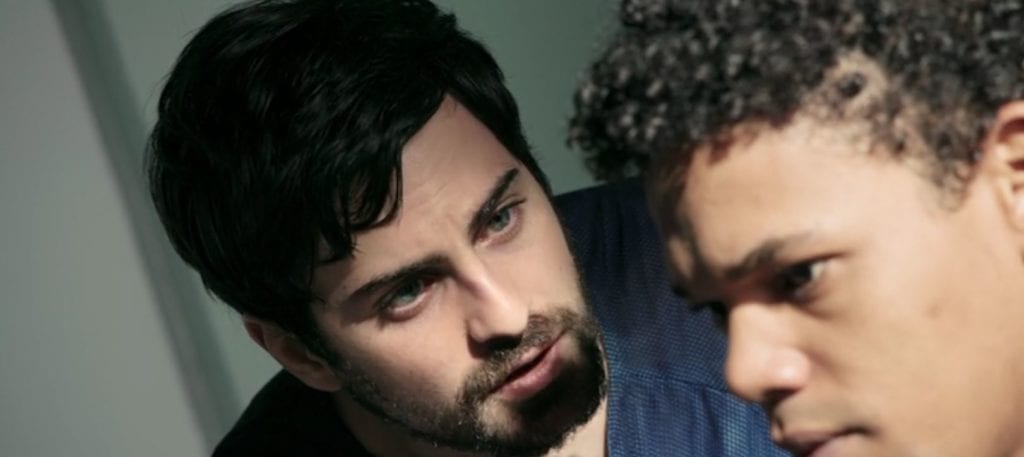
Rafael & Michele
Katie: So let’s jump over to episode six, “Glass” – while neither of us liked it as much, I feel like we have more to say about it. Let’s start with the most important point: the tendency for people in this show turn on water so they won’t be overheard and then start yelling over the sound of the water.
Priscilla: YES, HAHAHAHA! I actually wrote this on my notes.
Katie: Rafael turns on like, a trickle of water and then starts YELLING about how unjust the Process is. Calm down, Rafael! You’re a terrible mole!
Priscilla: YES! Right? Hahahahaha. And his mom wasn’t exactly quiet either. Unless the microphones are just around the faucet THAT’S NOT HOW IT WORKS.
Katie: Hahaha! I like that idea, the only place the Process has microphones is just right next to the faucet on sinks. Ezequiel insisted, thanks to his sink fixation.
Priscilla: Hahahaha! Speaking of Rafael, I had the impression he didn’t have that many ties aside from the Cause, but apparently he was a family guy! I was welcoming Rafael on the “problematic fave” territory with my arms open (and to be honest I still am?) but he was a huge dick when he revealed to Fernando that he and Michele were Cause agents. I mean, if he only revealed himself it would be a pretty bold move, but then Fernando would have no reason to help him. So I understand why he had to compromise Michele’s secret, but it was hers to tell. And he’s now putting her in real danger too.
Katie: That’s a good point! He’s still my problematic fave too, but it was a nasty thing to do. I like that it’s still really hard to tell what he’s doing for his own sake and what he’s doing for the Cause. And that it’s hard to tell because Rafael himself probably doesn’t really know.
Priscilla: Yeah, I have the same feeling with Michele too, because sometimes she seems to be on a personal vendetta. But she has moments of doubt, like when she remembers Bruna, while Rafael seems to be more cold blooded on that regard. I do feel he believe in what he’s doing, though.
Katie: I get the impression Michele joined the Cause for VERY personal reasons. I think she believes in it, and thinks she’s doing a good thing, but at the heart of it it’s a personal issue. Rafael is tougher. I think he’s much more of a “true believer” in the principles of the Cause but it’s hard for me to tell how much of that is a genuinely selfless impulse to improve the world and how much is… I dunno, a desire to be a hero, or to be important, or something along those lines.
Priscilla: That’s why Rafael’s “true believer” speech to Fernando was interesting. So far he went to great lengths for the Cause, and he doesn’t seem to regret it or doubt it like Michele does. I do think he has personal reasons or feelings thrown in the mix, and perhaps he doesn’t even know them yet. And Michele, well… Her motivations are pretty clear. I think part of what makes Michele so full of doubts when compared to Rafael is that her primary motivation to be here is not pro-Cause, but her personal feelings.
 Katie: Yes. I think it’s easier for him to convince himself that what he’s doing is totally justified. An there’s the difference that Michele sees The Process as unfair on a personal level, while Rafael sees it as unfair on a societal level.
Katie: Yes. I think it’s easier for him to convince himself that what he’s doing is totally justified. An there’s the difference that Michele sees The Process as unfair on a personal level, while Rafael sees it as unfair on a societal level.
Priscilla: That’s a good point! He “sells” the Cause speech better than she does, I feel.
Katie: Definitely! He has all the talking points down. When he was talking to Fernando I got the impression he’d given a very similar speech to other people before (if under different circumstances). Michele is going more on raw emotional energy and conviction.
Priscilla: Yeah. And Rafael is aware he’s a jerk, but I think he sees himself as a martyr jerk. He’ll sacrifice himself in altar of jerkness so that everybody can live a better life.
Katie: Haha! He’s totally a martyr. He doesn’t want to be a jerk, but he’s doing it to save all of you! If you only understood!
Priscilla: By the way, Michele’s test was so cruel! She must convince the parents of a girl she let die because of her belief in how much the process sucks that the process is a good idea.
Katie: I know! It was brutal!
Priscilla: I personally think she gave herself away a bit. To be honest if I were within the Process organizers I would have kept an eye on Michele a long time ago. And there must be some record of Michele’s brother and his death? That would make her a super risky mole. “Hey, who’s the mole, poor young girl or poor young girl who might have reason to seek vengeance?”
Katie: Haha! Yeah, the record keeping in this world is weird! It’s a combination of very detailed and intense, but also apparently not that hard to fake.
Priscilla: And they can figure out Joana isn’t really Joana, but not that Rafael isn’t really Rafael…
Katie: I was also wondering why no one recognized Rafael. I mean, it’s not shocking, but it does seem like it would be something he’d be more concerned about.
Priscilla: Yes! Especially because his Process was a year before his brother’s, if I remember correctly. Like, sure, they have tons of people in the initial tests, but no facial recognition system?
Katie: Yes! Given all the cameras and stuff everywhere, and the implications that their files are really detailed, it would seem like they’d have detailed profiles on who’s been there, what they look like, who has a reason to dislike the Process, etc. And yeah! You’d think that health body scan would have been like “oh hey! this guy from last year!”
Priscilla: Right? And those IDs of theirs don’t have pictures? That sounds like an awful system, hahaha. I can’t even get a movie discount if I don’t show a valid student ID with my picture, but they can have an opportunity to live in rich land with just their names.
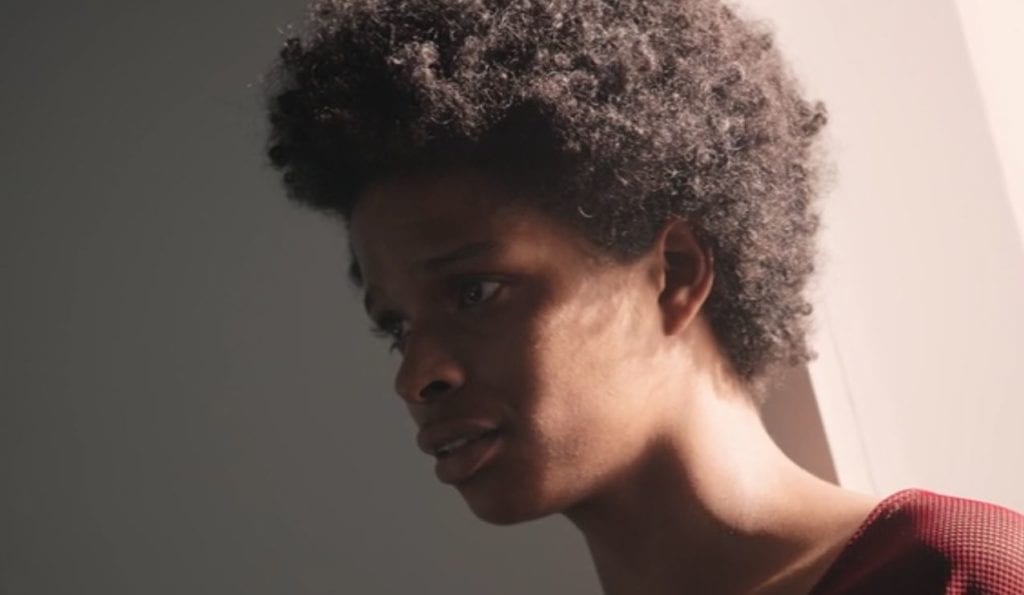
Fernando and Joana
Priscilla: So after a while on the sidelines, Fernando became important again during this episode. But the result for me was… mixed. I liked his interactions with his father, because you could see how much he changed his mind about the Process. On the other hand, he seemed to change his mind too much and too abruptly.
Katie: Agreed. I feel like it would have worked better if he just tried to confide in his father about his worries, but not be so dead-set on them. And then he seemed to flip around against when he slept with Michele, like “hey, whatever, as long as we’re together!” It made me not really understand how much he disliked the Process or what he really wanted.
Priscilla: Yes, exactly. It’s nice to see a disabled character that isn’t desexualized, but his feelings for Michele also evolved a bit too fast compared to what they were. So I think his interaction with Rafael was the only one that felt organic for the character we’ve seen this far. Because Day 1 Fernando would’ve defended the Process and denounced the Cause agents on sight, but this one didn’t. He knows Rafael has a point.
And what do you think about Joana in episode 6? She was another one who might be accused of having pretty abrupt feelings about something.
Katie: Joana was really interesting! At first I thought it was a little out of character for her to be so happy about being “chosen” and forgiven by the Process, but I can understand it a bit more as I’ve kept thinking about it. She’s never really been in a position where she was welcomed into a group and said she was fine as she was. That, plus promising her freedom, and I get it.
Priscilla: Her scene with “fake dad” was really interesting, not only for the tension but also because for the first time she admitted out loud (and to herself too, I believe) that she wanted to pass the Process. She’s the opposite of Fernando in that regard. So being someone’s favorite, being accepted for who she is without having to hide what she’s done… I can see why it made her happy.
Katie: It’ll be interesting to see where they go with it. In the early episodes I assumed Joana would be one of the first to rebel against the Process. But this makes sense too. She’s being told she’s exactly what the Process was created to find – people worthy of being lifted up to where they should be after years of mistreatment. I can imagine that being a relief to someone with Joana’s life.
Priscilla: On the other hand, I’m not a fan of what she says to Rafael when he asks for her help and she demands to know why he’s using a fake ID. She says the Process forgave her, but she still killed a person, accident or not. Can she forgive herself? Episode 3 gave me the impression that her real issue was not “what others may think”, but that she couldn’t forgive herself for it. So I can understand if this is a temporary feeling and at some point she’s gonna realise this group that chose her is not that perfect after all, and that “deserving” is very relative.
Katie: I do like that she’s happy about it, though. The more that I think about it, the more that is feels like a really believable response. And it could give her an interesting character arc that’s more dynamic than just distrusting the Process all the way through.
Priscilla: Yes. I get why she’s happy, but at the same point this conflictless happiness kind of undermines her inner conflict established over the past few episodes. And after so many episodes hammering how bad and unfair the Process is, it gives me a weird feeling that we’re supposed to think they’re nice with Joana and she “deserves” to be there.
Katie: Oh, that’s interesting. I don’t really think I interpreted it that way, but that makes sense. I was thinking we were supposed to assume that the Process was manipulating her in some way.
Priscilla: She always seemed to have a very cold analysis of the Process, unlike Fernando’s or Michele’s passionate views of it. So I understand why it’s tempting to her, but I hope the temptation doesn’t last. I still want her to be happy, though. She deserves it!
Katie: Me too. But on her own terms!
Priscilla: Exactly!
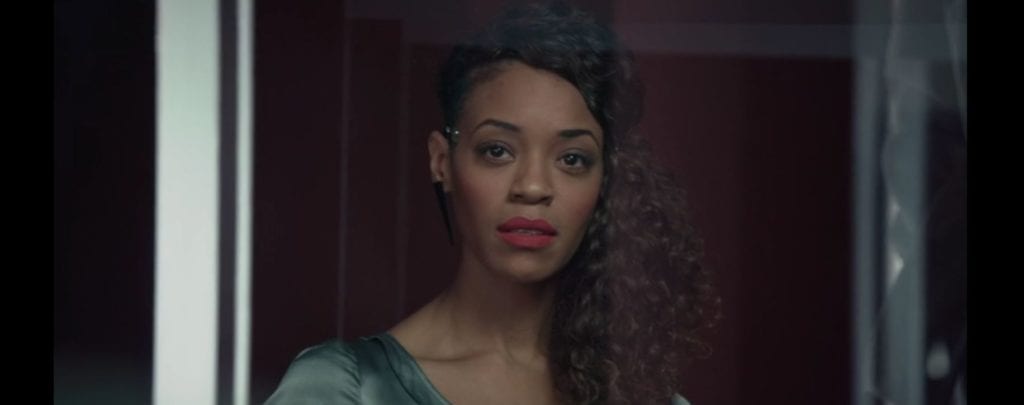
“A Softer Process”
Priscilla: What do you think about Aline? We never talk much about her, now that I’m thinking…
Katie: We don’t! I don’t have strong feelings about her, to be honest. I don’t know that she’s that much of a character outside of being a threat to Ezequiel.
Priscilla: I like how she’s unapologetically ambitious, but her ambition isn’t framed as evil (perhaps grey, but not evil) because she apparently defends a better Process. On the other hand, blackmailing Ezequiel isn’t exactly the mark of a true hero.
Katie: I’m not even sure what kind of Process she’s defending. Does she ever really specify?
Priscilla: Ezequiel said she wants to allow more people Offshore and defends a “softer” Process, and she complains whenever a test is unfair or based on questionable criteria, so she isn’t totally bad. At first she almost seems the good person that fights for a better Process, but then we see she has her own personal agenda.
Katie: Oh, right! I forgot about that.
Priscilla: On the other hand, it doesn’t sound to me that the Process was EVER fair. Even when Ezequiel assumed the Process, it was already only 3% of people allowed Offshore. So maybe this “softer Process” is more about the kind of people they allows in and less about “hey let’s not make 97% of the population starve so we can have our white walls and security cameras”.
Katie: Yeah, I get the impression the “softer Process” line meant less grueling for the candidates, maybe? Or even slightly expanding who gets in?
Priscilla: Yeah. Next season is gonna be the 5%
Katie: HAHA. The numbers will keep going up season to season until the show is called 97%
Priscilla: Hahahaha
Katie: Though maybe I’m being too hard on Aline. There’s something to be said for a Process in which multiple candidates don’t die every year.
Priscilla: Right? It’s a small progress. Especially because Ezequiel dehumanizes the candidates so much. Except for his golden girl Joana, hahaha!
Katie: Though she did assign Michele’s test, which seemed unnecessarily cruel.
Priscilla: Yes! Even though she wasn’t aware of the extension of the irony. Rafael’s test was mean too, but he deserved it. It was “petty mean” and not “cruel mean” like Michele’s.
Katie: Yeah, I had no problem with that one! More like a harsh truth. “Rafael, buddy, you don’t have any friends.”
Priscilla: Hahaha!
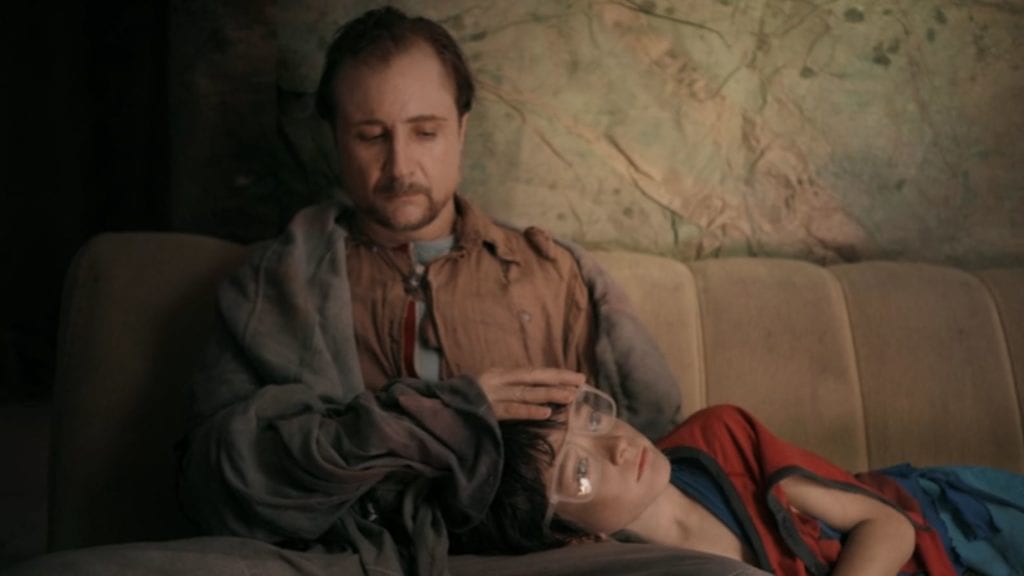
As our characters get closer and closer to the end, more and more questions are popping up. How will Fernando reconcile his growing distrust for the Process and his relationship with Michele? Has Michele been compromised? What was the capsule she cut out of her side with the shard of glass? Will Joana continue to buy into the propaganda of the Process? How is Ezequiel going to respond to all of this? Will Aliene achieve her goal? How are things going to wrap up in only two more episodes?
3% isn’t a perfect show, but it’s been an intriguing, imaginative one that clearly cares about its characters. Hopefully it can stick the landing in “Capsule” and “Button.”
Images courtesy of Netflix
[starbox id=”Priscilla,Katie W”]

